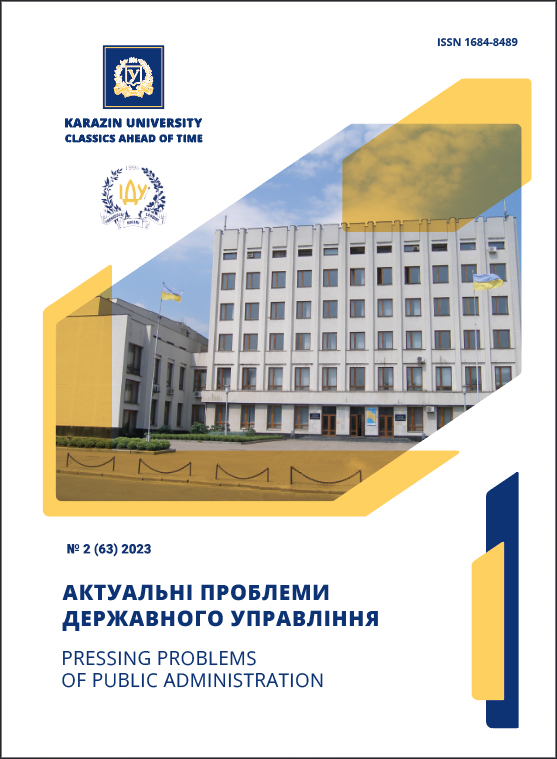From People to Public Policy: the Role of Human Capital in Sustainable Post-War Development of Ukraine
Abstract
The crucial role of human capital in enhancing the effectiveness of public governance systems and the principles of new public policy is investigated in the context of sustainable development and the most relevant United Nations Sustainable Development Goals. The analysis begins with an overview of human capital as a fundamental asset for socio-economic development, highlighting its impact on innovation, productivity, and overall economic growth. The research methodology includes the application of several general scientific methods for literature review and concise analysis of official data, emphasizing the interrelationship between investments in human capital and improved governance outcomes. Key findings indicate that regions with higher levels of education, health, and skills among the population tend to demonstrate more robust governance and sustainable development indicators, as well as resilience to severe shocks (such as war), and this represents a manageable policy parameter for governments. The paper also discusses challenges and opportunities for optimizing human capital, including policy recommendations for education, healthcare, and workforce development to support sustainable development in line with the UN’s rationale. Through its analysis, the article contributes to strategic planning and public policy formulation, which is crucial for more effective utilization of human capital for regional development and better public governance.
Downloads
References
Białynicki-Birula, P. (2019). The evolution of public policy tools: from traditional administration to interactive governance. Pressing Problems of Public Administration, 2 (56), 20–32. DOI: https://doi.org/10.34213/ap.19.02.02 [in Ukrainian].
Gazaryan, S. (2023). Creating effective governments in developing countries: from global goal to smart actions (the case of Brazil). Actual Problems of Public Administration, 1 (62), 114–130. DOI: https://doi.org/10.26565/1684-8489-2023-1-07 [in Ukrainian].
Huba, M. (2021). Social capital as a factor of community development. Tavrian Scientific Bulletin. Series: Public Administration and Administration, 1, 15–19. DOI: https://doi.org/10.32851/tnv-pub.2021.1.3 [in Ukrainian].
Demikhov, O. (2021). Strategy for regional development of public health in Ukraine: innovative aspects. Actual Problems of Public Administration, 1 (82), 84–87. DOI: https://doi.org/10.35432/
-8330appa1822021229141 [in Ukrainian].
Kartashova, O. & Babych, V.V. (2019). Regional economic development in the context of decentralization. Public Administration and Administration in the Processes of Economic Reforms: Proceedings of the III All-Ukrainian Scientific and Practical Internet Conference, 63–65. Kherson: Kherson State Agricultural University. [in Ukrainian].
Kud, A.A. (2021). Formation of social value based on existing platform solutions in the public sector. Actual Problems of Public Administration, 1 (59), 51–67. URL: https://periodicals.karazin.ua/apdu/article/view/19398. DOI: https://doi.org/10.34213/ap.21.01.06 [in Ukrainian].
Tsimbal, B.M. (2022). Public administration of personal security through the prism of social protection and social security. Public Administration and Customs Administration, 3 (34), 58–61.
[in Ukrainian].
Shcherbakov, P. (2020). Human capital as a factor of public administration in the socialization of the economy. Aspects of Public Administration, 8 (6), 239–246. DOI: https://doi.org/10.15421/1520122 [in Ukrainian].
Aligning Human Capital with Business Strategy. URL: https://partnership-monitor.alerts.ztf.uw.edu/text-explore/viewcontent?docid=HzN:5026&Edu=Harvard_business_school_human_resources.pdf
Bersin, J. (2023). Sustainability Is About Your Workforce, Too. Harvard Business Review, 9.
URL: https://hbr.org/2023/09/sustainability-is-about-your-workforce-too
Biller White, T. (2020, May 28). Navigating new and emerging risk – an interview with Gard’s Chief Risk Officer. Gard.
Deloitte. (2023). 2023 global human capital trends report. URL: https://www2.deloitte.com/content/dam/insights/articles/glob175985_global-human-capital-trends-2023/glob175985_human-capital-trends-2023.pdf
Garton, E. (2017). What If Companies Managed People as Carefully as They Manage Money? Harvard Business Review, 5. URL: https://hbr.org/2017/05/what-if-companies-managed-people-as-carefully-as-they-manage-money
Human Development Index (HDI). URL: https://hdr.undp.org/data-center/human-development-index#/indicies/HDI
Human development index score of Ukraine from 1990 to 2021. URL: https://www.statista.com/statistics/877624/human-development-index-of-ukraine/#:~:text=The%20Human%20development%20index%20(HDI,decreased%20from%20the%20previous%20measurement.
Mensah, J. & Sandra Ricart Casadevall. (2019). Sustainable development: Meaning, history, principles, pillars, and implications for human action: Literature review. Cogent Social Sciences, 5 (1). DOI: https://doi.org/10.1080/23311886.2019.1653531
Molinoari, E., Kruglanski, A.W., Bonaiuto, F., & Bonnes, M. (2019). Motivations to act for the protection of nature biodiversity and the environment: A matter of “Significance.” Environment and Behaviour. Sage, 1–31. DOI: https://doi.org/10.1177/0013916518824376.
Philip, P., Claire Ibrahim, C. & Hayward, E. (2022, November). Work toward net zero:
The rise of the green collar workforce in a just transition, Deloitte.
Sen, A. (2010). Equality of what? In: MacMurrin, S. M. (Ed.), The Tanner lectures on human values, 4. 2nd ed. Cambridge: Cambridge University Press, 195–220.
Swain, R.B. & Yang-Wallentin, F. (2019). Achieving sustainable development goals: predicaments and strategies. International Journal of Sustainable Development & World Ecology,
(2), 96–106. DOI: https://doi.org/10.1080/13504509.2019.1692316
Toth, R. (2013). The Dynamics of Entrepreneurial Human Capital. Bulletin of Indonesian Economic Studies, 49 (1), 115–116. URL: https://www.tandfonline.com/doi/full/10.1080/00074918.2013.779771. DOI: https://doi.org/10.1080/00074918.2013.779771
UNDP. (2019). Human Development Report 2019. Beyond income, beyond averages, beyond today: Inequalities in human development in the 21st century. New York. URL: https://reliefweb.int/attachments/27997fac-d150-394b-bda1-a668a7045473/hdr2019.pdf
UNDP. (2023). The institutional framework in the field of human capital development policy (part 1). Berlin: UNDP. URL: http://surl.li/qfpxm
Zhu, M. (2023). The role of human capital and environmental protection on the sustainable development goals: new evidences from Chinese economy. Economic Research-Ekonomska Istraživanja, 36 (1), 650–667. DOI: https://doi.org/10.1080/1331677X.2022.2113334

